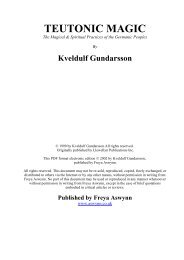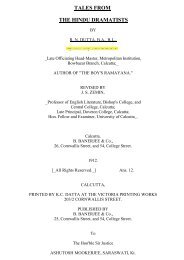Untitled - Awaken Video
Untitled - Awaken Video
Untitled - Awaken Video
Create successful ePaper yourself
Turn your PDF publications into a flip-book with our unique Google optimized e-Paper software.
Chapter 7. At the Well of Urð 172<br />
This method for accessing knowledge does not require that anyone hold any<br />
particular set of religious beliefs or hold any beliefs at all, for that matter. It is<br />
simply a way of changing behavior so that one is acting “in accordance” with the flow<br />
of power/ luck which moves up out of the Ginnungagap, through the Underworld,<br />
and out onto Midgard. Secondly, it has historical precedence: ritualized behaviors<br />
as outlined in the Hávamál were practiced for almost half a millennium before some<br />
of them began to slowly be replaced by ideas brought in from outside the Germanic<br />
realm.<br />
The Hávamál literally translates as “The Sayings of Har,” and Har is one of the<br />
epithets for Óðínn, Chief of the Æsir. This name does not, and apparently never<br />
did, imply that this collection of strophes was composed by Óðínn, but implies that<br />
this set of guidelines led one to “act” in accordance with knowledge. R. I. Page in<br />
The Viking Chronicles outlines the use of the Hávamál:<br />
“The collection of the verses known as the Hávamál . . . . form one of the<br />
most important, and baffling, of the Eddic [sic] poems. What survives is<br />
a group of separate and very different poems brought together under this<br />
one title . . . . Subject matter is diverse, and different metres are used in<br />
different sections. There are stanzas of popular wisdom, proverbial in mood<br />
and dealing with everyday matters like poverty and riches, hunger, shelter<br />
and comfort, how to live and die well, who to trust and who to suspect,<br />
how to gain friends and how to keep them, how to outwit your enemies, the<br />
temptations of strong drink, and how to avoid troubles with the opposite sex<br />
. . . .It is fairly clear, at any rate to the unbiased, that . . . a good deal of the<br />
poem derives from earlier times” 1<br />
The poem is a collection of pragmatic pieces of wisdom that when put into proper<br />
action, the measure of one’s life can improve immensely.<br />
Page further divides the Hávamál into groups (not necessarily the order of the<br />
verses within the collection) and his divisions list out thus:<br />
1. the poor foot-traveler: “. . . the traveler, his needs, his reception in a strange but<br />
apparently hospitable farm and the qualities he must show . . . . stress on the<br />
lurking danger a wanderer must be ready for when he arrives at a strange village,<br />
his need to keep his wits about him and to pay for hospitality shown him with<br />
conversation and gossip.” 2<br />
a) the alternative view of death: of the importance of living well instead of dying<br />
needlessly.<br />
1 Page, R. I., The Chronicles of the Vikings, 1995, (BarnesandNoble Books, New York), p.<br />
139. 2 Page, R. I. Chronicles of the Vikings (Barnes & Noble, New York, NY) 1995, p. 140.
















